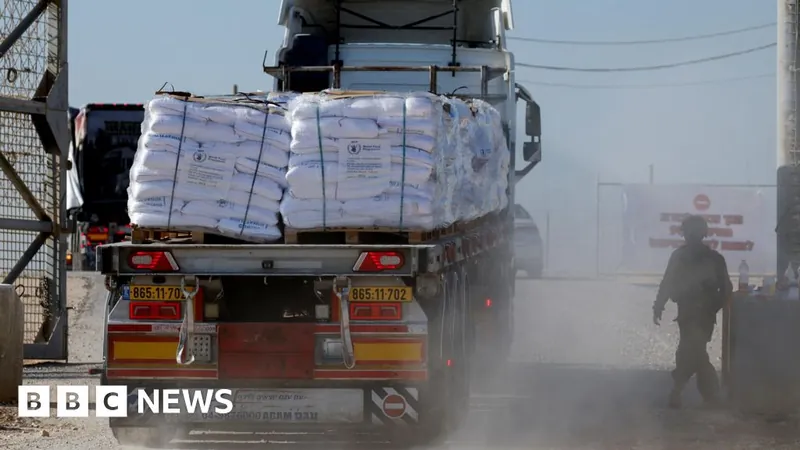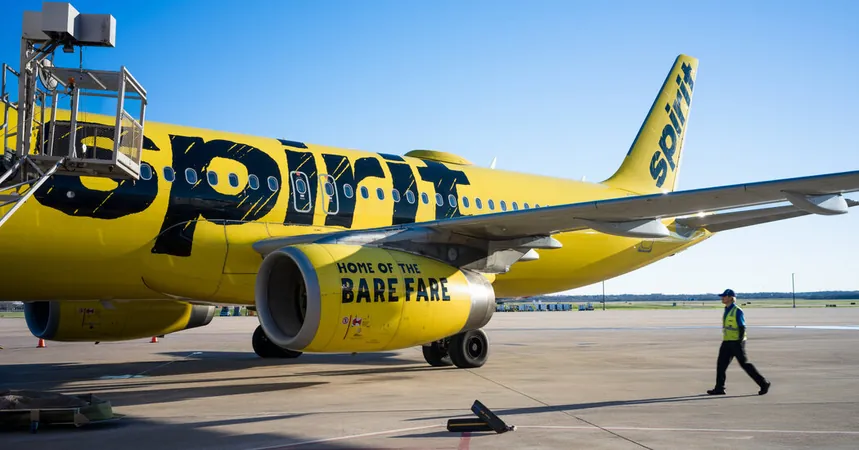
Criminal Gangs in South Gaza Block Aid Amid Dire Humanitarian Crisis
2024-11-26
Author: Wai
In a grim turn of events, the distribution of humanitarian aid in southern Gaza has been severely hampered by violent criminal gangs, resulting in insurmountable food shortages for the region's already vulnerable population. According to multiple aid workers and local residents, armed groups are brazenly operating along restricted zones near the Israel Defense Forces (IDF) border, significantly obstructing relief efforts.
The escalating situation follows a catastrophic incident on 16 November, during which nearly 100 United Nations aid trucks were looted, leading to injuries among many Palestinian drivers. This brazen operation marked one of the most significant losses of aid since the onset of the ongoing conflict. Following this crisis, a special security force reportedly activated by Hamas aimed to reclaim control and re-establish law and order.
The notorious Al-Masri family, known for their criminal activities, has recently blocked key access routes like the Salah al-Din Road, vital for aid distribution. Witnesses described how they erected iron barriers and even fired upon trucks approaching the aid points. Sam Rose, deputy director of the United Nations Relief and Works Agency (UNRWA) in Gaza, lamented the complete breakdown of law and order in the area, describing how the power vacuum has allowed gangs to thrive.
As Gaza enters the rainy winter months, humanitarian officials warn that it’s crucial to resolve these challenges to meet the spiraling needs of the region's 2.3 million people. Georgios Petropoulos, head of the UN’s humanitarian office in Gaza, pointed to a worrying spiral of "ultra-violence" stemming from various factions, including looters and law enforcement.
The efforts by Hamas to curb crime have drawn mixed reactions. Some displaced Gazans express support for these initiatives, believing they might curb rampant theft while others interpret it as a strategic move to assert dominance in a fractured economy. Critics argue that Hamas's actions suggest a cunning elimination of rivals in the criminal landscape, contributing to what some describe as a mafia-like control over the region's black market.
Compounding the crisis, aid deliveries into Gaza have plummeted to alarming lows. While the threat of famine looms heavily in northern regions, southern Gaza faces acute shortages of food, medicines, and essential goods. Prices for staples have surged astronomically, with basic items like flour and eggs becoming unaffordable luxuries.
Umm Ahmed, a resident of Khan Younis, continues to struggle with her children's hunger while waiting in line for loaves of bread. With little to no access to food and basic hygiene products, she expresses her family's desperation, pleading for fairness in aid distribution.
Despite pressure from the United States for Israel to allow increased aid truck access, Israeli officials cite restrictions from UN and other relief organizations as the primary bottleneck. Aid workers challenge this narrative, calling for a relaxation of entry restrictions to facilitate more efficient deliveries. They insist that the deteriorating public order must be addressed and implore Israel to fulfill its obligations as an occupying power to ensure security and assistance for the civilian population.
Complicating matters further, with commercial imports banned by Israel, the black market for essential goods, including food and even cigarettes, has flourished. Smuggling operations have become rampant, often involving violence as gangsters target incoming aid shipments. Recent intelligence suggests that stolen goods are stored under the watch of Israeli military control, raising questions about the adequacy of security measures in place.
In a perplexing development amidst this chaos, media reports hint at Israel contemplating the use of private American military contractors for aid distribution. While no formal plans have been announced, such a shift raises significant concerns among humanitarian workers, who warn of the potential for increased violence and complicating factors in an already tense situation.
As the situation in Gaza remains dire, the pressing need for coordinated, effective humanitarian aid becomes ever more urgent, while the tangled web of crime, control, and conflict continues to complicate relief efforts.




 Brasil (PT)
Brasil (PT)
 Canada (EN)
Canada (EN)
 Chile (ES)
Chile (ES)
 España (ES)
España (ES)
 France (FR)
France (FR)
 Hong Kong (EN)
Hong Kong (EN)
 Italia (IT)
Italia (IT)
 日本 (JA)
日本 (JA)
 Magyarország (HU)
Magyarország (HU)
 Norge (NO)
Norge (NO)
 Polska (PL)
Polska (PL)
 Schweiz (DE)
Schweiz (DE)
 Singapore (EN)
Singapore (EN)
 Sverige (SV)
Sverige (SV)
 Suomi (FI)
Suomi (FI)
 Türkiye (TR)
Türkiye (TR)